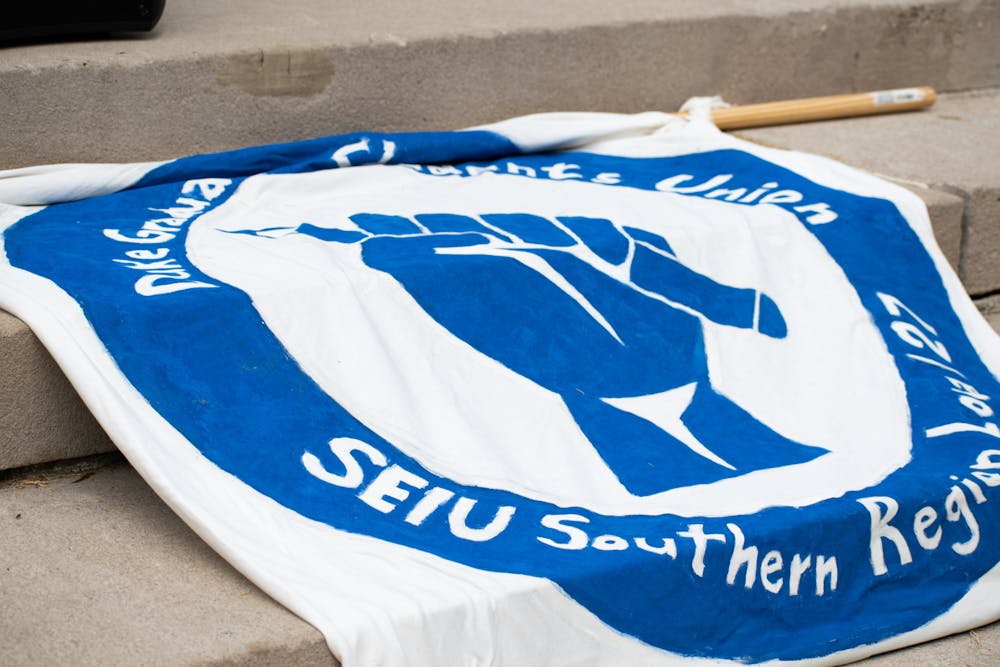Unions are formally recognized bodies of workers who join together to establish collective bargaining power in a workplace. Recognized unions at Duke span dining, publishing, transit and academics. They include the American Federation of State, Council, and Municipal Employees Local 77; the Duke Faculty Union; the Amalgamated Transit Union Local 1328; and the Duke University Press Workers Union. Currently, Duke Graduate Students Union is in the process of seeking recognition.
Duke Workers United is a coalition organization of unions across campus. The group routinely meets to coordinate workers' campaigns and build solidarity between organizations.
If a union gains formal recognition from the National Labor Relations Board, which sometimes takes rounds of elections, the University is legally required to bargain with them.
North Carolina is a “Right-to-Work” state, meaning that labor unions cannot require workers to join on condition of their employment. This means that even if a union is NLRB-certified, all employees are not members by default; they must choose to join the union. Workers who are not unionized, however, will still be subject to the outcomes of union-employer bargaining.
Duke Graduate Students Union
The Duke Graduate Students Union is currently a direct-action, direct-join union formed in the spring of 2017, but recently relaunched a drive for formal recognition on new Dean Suzanne Barbour’s first day.
The organization is “united by [its] belief in the dignity and value of graduate student workers,” according to its constitution.
The DGSU was initially intended to be a union formed in partnership with the Service Employees International Union, with organizing starting in early 2016. Following the indeterminate results of the union’s NLRB election, the DGSU decided to become a direct-join union.
Unlike NLRB-recognized unions, direct-join unions are unable to negotiate contracts with employers that would provide legal protection for their demands. Despite this, the DGSU was still able to make progress toward their demands.
“A good example of both the efficacy and the shortcomings of the direct-join model is our 12-month [stipend] funding win. We agitated for this and won it, but haven't been able to enforce the way Duke admin has implemented it years later,” wrote Matthew Thomas, DGSU co-chair and a third-year doctoral candidate in the English department.
The DGSU has also successfully petitioned for graduate students to be eligible for discounted dental services at the University’s Campus Smiles office, opposed University actions to rescind dependent coverage and increase deductibles and advocated for extended parental leave.
However, the DGSU’s fight continues. On Labor Day, the DGSU announced demands for a $40,000 pay floor for all graduate students.
“We also have a host of issues that we're fighting for including grievance procedures, racial equity on campus, international student issues, improved healthcare benefits with comprehensive vision and dental, real 12-month funding, and more,” Thomas wrote.
Local 77 Chapter of American Federation of State, County and Municipal Employees
The AFSCME Local 77 chapter is one of Duke’s oldest worker bargaining bodies. It began as the Duke Employees Benevolent Society in 1965, focusing on issues of the university’s majority African-American working-class staff.
Local 77 is best known for organizing a mass protest in 1968 called the Silent Vigil. The event was sparked by the assassination of Dr. Martin Luther King Jr. and focused on recognition of workers’ collective bargaining power, implementation of the federal minimum wage and racial equality in Durham and surrounding areas.
In 1972, the group became an NLRB-recognized union and a chapter of the AFSCME.
Today, the union has over 500 dues-paying members, according to Charles Gooch, Local 77 chief steward and Duke food service worker.
Gooch, who began working at the University in 1974, joined the union in 1977. Local 77, he says, has been central in protecting workers and raising pay over the years.
“Most of the service workers you see here [are] because of the Union. Especially if you’re a person of color,” Gooch said.
Get The Chronicle straight to your inbox
Sign up for our weekly newsletter. Cancel at any time.
“We have put so much in this [union] ever since the 1960s,” he said. “When I started here at Duke, I made about $1.60 an hour … we’ve got people in the union making $20 and $22 an hour.”
In 2005, Local 77 reached an agreement with Duke, negotiating a wage increase and a $10 minimum starting wage, among other worker victories.
Local 77 recently held their internal board elections on Sept. 14, and results will be announced at the next union general meeting.
Duke University Press Workers Union
The Duke University Press Workers Union is an NLRB-recognized union. The organization believes that “workers must have a decisive role in creating a workplace worthy of people investing their time, energy, and talents,” according to its mission statement.
DUP Workers Union went public in March 2021, but Duke did not voluntarily recognize the union. In June 2021, employees voted in favor of legal certification. However, Duke appealed to contest the union’s legal certification. After deliberations, the NLRB dismissed Duke’s appeal and granted the union legal certification.
DUP Workers Union is a member of the News Guild, a sector of the Communications Workers of America Union. DUP Workers Union does not yet have a contract negotiated with the University.
“From the beginning, we organized as a wall-to-wall bargaining unit,” said Alejandra Meija, DUP workers union co-vice chair. That means “everyone from the warehouse to marketing to editorial” is included under the union’s purview.
“Duke University Press itself is a very academic publisher … something that is often overlooked is all the labor that is taken in order to make these books possible,” Meija said.
According to the organization’s website, some aims of the union are to increase pay for workers and equalize benefits between hourly and salaried employees.
Meija sees DUP Worker Union’s success in receiving legal certification as part of a larger trend across the country.
“I really admire the people in all of the unions,” she said. “They’ve been super supportive … all that solidarity is something that really warms my heart and makes me hopeful for the future.”
Duke Faculty Union
Local 26 of Service Employees International Union Southern Region, also known as the Duke Faculty Union, is a union of over 200 non-tenure-track faculty members.
“We are committed to ending job insecurity and poverty wages in academia, protecting academic freedom, and providing an excellent education to all Duke students,” read the union’s mission statement.
The University differentiates between non-regular rank faculty members, who are non-tenure, and regular rank members, who can be either tenure-track or non-tenure track.
“These [non-tenured] positions are often low-paying and not eligible for benefits at many institutions. On top of that, these positions are often one-semester or one-year at a time, with no certainty of renewal,” wrote Christopher Shreve, DFU president and a lab instructor in the Department of Biology.
The DFU first began organizing in 2015 under the name “Duke Teaching First.” In March 2016, the University’s non-regular-rank faculty voted in favor of a union, with a resounding 174-29 final tally. Later that September, the DFU first began bargaining with the University, ratifying the union’s first contract in July 2017.
“We know that when workers, including faculty, feel valued and respected that they are more likely to stay and develop professionally, allowing us to strengthen our academic programs and explore new ways of meeting our students’ educational needs,” Shreve wrote.
Amalgamated Transit Union Local 1328
The ATU Local 1328 represents Duke’s bus driving and transportation staff. The group describes itself as a “labor organization representing transit workers in Raleigh, Durham and Wilmington NC,” according to its Facebook page.
The union has been recognized since 1975. In 1992, the NLRB ruled that Duke was illegally refusing to bargain with the body of organized workers.

Vishal Jammulapati is a Trinity sophomore and an associate news editor of The Chronicle's 118th volume.

Audrey Wang is a Trinity senior and data editor of The Chronicle's 120th volume. She was previously editor-in-chief for Volume 119.

